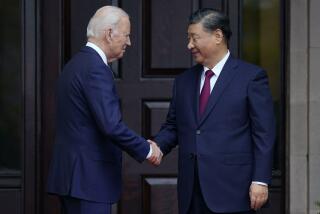U.S. Eases Curb on China Meetings : Sanctions: The Chinese foreign minister is invited to Washington as the Administration seeks Beijing’s backing on U.N. vote against Iraq.
- Share via
WASHINGTON — The Bush Administration, which is seeking China’s backing for a new U.N. resolution against Iraq, on Tuesday substantially eased the ban on high-level meetings between U.S. and Chinese officials that was imposed after the 1989 massacre in Beijing.
The State Department announced that Secretary of State James A. Baker III has invited Chinese Foreign Minister Qian Qichen to Washington on Friday, where Qian will be the highest-ranking Chinese visitor in the past 18 months. U.S. officials also left open the possibility that Qian will meet with President Bush.
For months, U.S. China scholars and experts had been predicting that the Administration would loosen its sanctions against Beijing soon after the U.S. congressional elections. Administration officials insisted Tuesday that they are not abandoning the sanctions adopted after China crushed the pro-democracy movement at Tian An Men Square in June, 1989. But they gave the ban on high-level exchanges a much narrower interpretation than previously.
“We’re being tentative,” one Administration official explained. “We want to try to give them a little and then watch.”
The announcement of the Washington visit by Qian Qichen (pronounced Chien Chee-chun) came only days after authorities in China charged two pro-democracy activists with counterrevolution and sedition--crimes punishable by long prison sentences or even death.
“It (the Bush Administration’s action) must cause deep disappointment among the Chinese people,” Liu Binyan, a leading Chinese writer and dissident, said in an interview Tuesday in Washington.
Mike Jendrzejczyk, Washington director of the American human rights group Asia Watch, said the Bush Administration’s invitation to Qian sends a message that “continued cooperation in the (Persian) Gulf can bring an end to international criticism and isolation, no matter how severely China abuses the rights of its own citizens.”
The State Department also confirmed Tuesday that Baker will meet with Cuban Foreign Minister Isidoro O. Malmierca in New York City later this week, the highest-level meeting between the United States and Cuba in two years. Cuba, one of the 15 members of the Security Council, generally has opposed U.S. policy in the gulf. The council is expected to vote later this week on a resolution authorizing the use of force against Iraq.
As one of the five permanent members of the U.N. Security Council, China has the power to veto council resolutions. State Department spokesman Richard Boucher noted Tuesday that “to date, China has consistently held to the Security Council consensus on the gulf crisis and has voted for every one of the 10 U.N. Security Council resolutions in response to Iraq’s continuing aggression.”
Asked whether Baker’s invitation to Qian amounted to a payoff for China’s vote on a new U.N. resolution authorizing force against Iraq, Boucher replied: “China’s vote . . . will be based on its own national-interest determination.”
Since August, China has criticized Iraq’s invasion of Kuwait. But it has also often emphasized that it opposes the use of force by superpowers in the Middle East.
Most diplomats, scholars and U.S. officials have said they believe China would not veto a U.N. resolution allowing the use of force against Iraq because the Beijing regime needs foreign loans, trade and investment and does not want to jeopardize its efforts to improve ties with the United States and other Western countries.
The Bush Administration’s sanctions against meetings with Chinese leaders date back to June 20, 1989, two weeks after the massacre in Beijing, when Baker announced on Capitol Hill that the Administration was suspending talks between officials of the U.S. and Chinese governments at the level of assistant secretary or higher.
Only two weeks later, the Administration dispatched National Security Adviser Brent Scowcroft and Deputy Secretary of State Lawrence S. Eagleburger to Beijing on the first of two secret missions aimed at smoothing ties with the Chinese leadership.
Administration officials argued that the Scowcroft missions did not violate the policy because it applied only to “exchanges” between the two governments--that is, official visits to each other’s capitals.
Baker himself has met with the Chinese foreign minister four times over the last 18 months. But the sessions were restricted to foreign capitals or the United Nations and were aimed largely at discussing Cambodia or the Persian Gulf.
More to Read
Sign up for Essential California
The most important California stories and recommendations in your inbox every morning.
You may occasionally receive promotional content from the Los Angeles Times.













